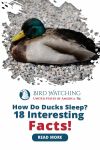
What’s this Post about?
As unique as ducks may appear, they have distinct features and abilities that make them different from other birds. If you’re out for a walk, sitting by a lake, or hanging out at your local park, you might spot these stout little beings being fed bread and popcorn.
Do you find yourself intrigued by their behavior? Do you want to learn more about how they function and what they do?
Well, we’re here to let you in on the oddest, most unusual bodily changes that these birds go through, that is, changing their gender. It’s not something every bird does. They have fascinating abilities that you should know about!
Ducks are capable of changing their gender from female to male. This usually happens when a female loses one of her ovaries to infection. Consequently, the female duck starts transitioning into a male duck. In this process, first come hormonal changes, and second come physical changes.

What’s A Ducks Default Gender?
You’ll be surprised to learn that a duck’s default gender, is male. Usually, in humans and other mammal species, the default gender is male and female, but such isn’t the case with ducks.
In essence, the default gender is a male when a duck is born. Z (male) and W (female) are sex chromosomes in birds, and the presence of a W chromosome facilitates the formation of a female (ZW). Without this, male traits emerge (ZZ), and hence male is the default sex in birds.

Chromosomes determine sex in both mammals and birds. To understand why female ducks might start transitioning to a male, it’s necessary to realize that female ducks have all of their eggs in one basket found in their single ovary. And that ovary can die as a result of injury, infection, or damage.
did you know?
Female ducks that undergo gender changes, later on, develop testis, which changes their whole biological gender and therefore can be deemed as a male.
And, because there is no spare ovary, the release of estrogen (a sexualizing hormone in birds) is entirely halted, eliminating the hormone that stifles the male genes on the Z chromosome. As a result, male plumage develops in females in response to bodily changes.
Can Ducks Change Gender?

Ducks can change their gender depending on their situation; for example, if a female duck is at the risk of losing the only functioning ovary, then there’s a high chance that it might turn into a male after losing it. It’s that simple.
Although this phenomenon doesn’t occur a lot, it still is witnessed by many who have pet ducks or live close to them. The transition is always from female to male and never from male to female because the default gender that the ducks are born with is male.
Through a controlled experimental dissection and multiple tests, including removing the ovaries of living ducks, it was discovered that transitioned male ducks are also capable of breeding and fertilizing eggs.
fun fact
A duck can live between 2 and 12 years.
Without female hormone restriction, the tissues of the rightmost vestigial ovary masculinize and evolve into a testis. This sperm has even been found to be functional and capable of resulting in successful egg fertilization.
If you are an avid bird watcher, you are probably aware that you can accurately determine a duck’s gender based on its color and markings. It is very often that both genders do not look similar at all.
What Duck Species Changes Their Gender?

There have been several observations of female to male gender transitions in ducks, among which two duck species have been seen changing their gender; mallard and mandarin duck. Read on to find out more about them.
Mallard

In mallards, the males usually have a flashy green head, a white band around their necks, and a bright yellow beak. Their bodies are grey with brown streaks on either side. This makes them stand out among the fray.
The female mallards are dull in color, having a brown body with white molts on them. This is because they need to steer clear from trouble by blending into the background, especially when they are close to the nests so that predators don’t target them.
Mallards have been observed by locals closely, and some individuals can confirm that these ducks have been seen changing their gender.
However, the gender transition can occur in just about any bird species since they all have a single basket for their eggs, which can cause them to change when destroyed or damaged.
did you know?
Male ducks have flashy colored and vivid patterned plumage, while females are considerably more muted, with neutral hues and speckled patterns to help them hide from predators when they are in their nesting period.
Mandarin Duck

Mandarin ducks are exotic-looking birds that are vividly colored birds. Males have back orangey tail feathers, coppery streaked cheeks, and a tiny red beak with a white tip, and females have an overall brown plumage with tiny speckles and a gray head.
Another duck species that has been witnessed changing its gender is the mandarin duck. The Z chromosome controls the male traits in a duck. But, since females have a Z chromosome, what’s to stop them from developing the male’s colorful plumage every year?
The answer to this question lies in the ovary they carry. In ducks, the left ovary functions, while the right side ovary remains a tiny ball of cells. As a result, almost all the birds develop only a single functional ovary which then pumps out female hormones that actively stifle the male ones.
When ducks lose their ovary to damage or illness or any other natural cause, the undeveloped right ovary in the duck begins to develop in response to male genes on the Z chromosome, which then transforms into proper functional testes.
fun factPRO-TIP
The male molts appear pretty much identical to a duck during the summer season, with just its sharp red beak signifying his sex.
Why Does Gender Change Happen?

The reasons that cause this to happen are not quite fun as it’s made to look. Female ducks have to go through loss and damage to turn into male ducks finally. This damage can either be caused by an illness, disease, or injury of some sort.
When this happens, the duck’s natural body response is to start transitioning. However, they do not voluntarily partake in it; it just happens, and they have to wait it out and adopt all the male traits that naturally come with their unusual transition.
fun fact
Ducks have just one Ovary and Oviduct - A female duck has two ovaries and oviducts when it's a fetus. But when grown, however, only the left ovary and oviduct remain functioning.
Is Gender Change In Ducks Rare?

Although gender change has been observed in ducks for years, it still is rare for them to do so. Why? Well, to answer that question, one should know that female ducks have to lose their ovary in order to become drakes. And that is one long process.
Female ducks have a special bundle of cells that produces a male gene suppressing hormone estrogen and carries only a single basket of eggs with them if their ovary stops functioning or is damaged due to some naturally occurring reasons.
There is a high chance for a female to start molting and produce feathers that look exactly like a male duck. Since their active ovary dies and they can’t lay eggs, they might be able to produce sperm as the male genes kick-start a transformation of the underdeveloped ovary, turning it into a functioning testis.
Visible Differences Between The Genders To Look Out For

As a bird watcher, you must be aware that ducks can easily be identified based on their gender alone. How’s that done? Well, there are some significant differences to look out for. Although there are several species of ducks, we’re going to mention the differences seen across every bird species.
Size
Males have larger heads and thicker necks compared to females.
Sound

Female ducks have a loud and hard quack, whereas males have a soft and rough quack.
Behavior
Male and female ducks have distinct behavioral characteristics. Male ducks exhibit a wide range of gender-specific behaviors that differ from their female counterparts.
Male mallard ducks, for example, woo females by bobbing their heads from one side to the other.
So the gist of all the differences is:
- The male ducks are more colorful and flashy than the female ducks.
- The males are generally larger than the females in terms of size.
- The males of most species have a noticeable curled feather near the tail that females do not have.
- Male ducks have a soft, harsh quack, while females have a unique loud quack.
Do Transitioned Ducks Exhibit These Behaviors?

Although female ducks physically and hormonally undergo changes and have fully functioning male characteristics, there’s not much research out there on whether they exhibit the differences mentioned above.
But since there’s not much research on it, what can be said is that the changes are significant and that these ducks may act like males during the breeding season since they no longer can lay eggs and have a fully functioning testis.

Keep Reading!
In conclusion, not all ducks can change gender. Only the female ducks undergo these changes, and that too when they lose their ovary due to injuries or infections. They can’t just change their gender on will; that’s not ever the case. This is one of the reasons why gender changes are not seen often.
While the bird’s sex has changed physically, her Z and W chromosomes remain throughout every cell. So, although genetic clusters and their arrangement influence the early phase of development of sexual traits, the W chromosome has minimal effect on the bird’s sex beyond maturity.
Birds that go through this natural sex transition are rarely healthy because of the underlying disease that causes ovary death.
Do you feel fascinated enough reading up on some weird yet interesting facts? Here’s another post you can read to find out more about ducks and how they sleep!
How Do Ducks Sleep? 12 Interesting Facts!
Do you ever wonder what happens to ducks after dark? Precisely how do ducks sleep? Take an intimate peek at the duck's nocturnal behavior.

By David A. Swanson
Bird Watching USA
My name is David and I'm the the founder of Bird Watching USA! I started Bird Watching with My father-in-law many years ago, and I've become an addict to watching these beautiful creatures. I've learnt so much over about bird watching over the years that I want to share with the world everything I know about them!

David A. Swanson
Bird Watching USA
My name is David and I'm the the founder of Bird Watching USA! I started Bird Watching with My father-in-law many years ago, and I've become an addict to watching these beautiful creatures. I've learnt so much over about bird watching over the years that I want to share with the world everything I know about them!








